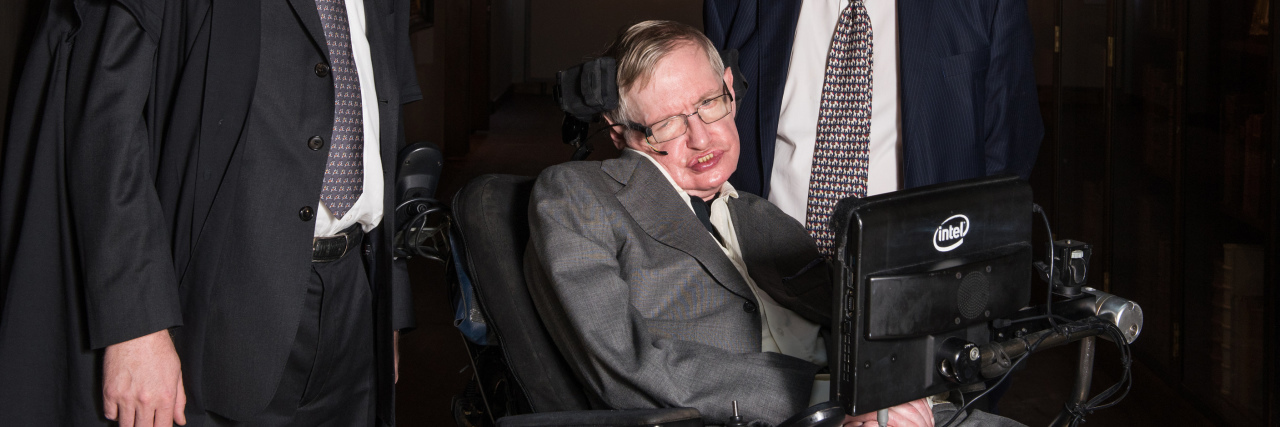During my life with disability I have been in many a debate with others about it — motivation, ability to work, education, benefits and so on. Occasionally, people will use Stephen Hawking as an example of someone with disability who did well with their life, and there is no doubting that. He was an incredible man with an amazing mind and contributed massive advancements to science and society. But this use of Stephen Hawking annoys me greatly, because by every measurement he was extraordinary. Very few of us can be like him. There were things about his life that contributed to his success, and privileges others do not have.
First of all, Stephen Hawking developed amyotrophic lateral sclerosis during his post-graduate years at Cambridge University in England. He wasn’t born with it, and although developing his condition was traumatic, he had an able-bodied childhood and education, which many people with disabilities do not have. Who can say how things might have been different if he was born with a disability?
As someone who has had a condition my whole life, although not as debilitating as ALS, I know it impacted my early years and affects who I am today. With Asperger’s syndrome I struggled socially and school quickly became something I dreaded. I seemed different, and I felt different on the outside. Although I was not diagnosed until much later, I think I became depressed as early as 8 or 9. I remember crying on the bench during every break time in school. I felt isolated and alone, and although I did well during my education on paper, I could never muster the social skills to do anything with it.
Moreover, Hawking’s condition did not directly attack what makes Hawking so brilliant – his mind. There are many conditions both mental and physical that impact the brain. While Hawking did naturally struggle with depression because of his condition, he still had a social life and his intelligence was never taken from him.
Stephen Hawking had two well-educated parents who were very interested in his education. A lot of people, whether able-bodied or not, do not have this. Hawking took exams to get scholarships for private schools and probably would not have done this if his parents weren’t interested. Many people live in a reality where they do not have the head space, time or finances to spend a lot of time with their children, and so their education can go by the wayside. Some people do not have good families and have abusive parents, ranging from violent to neglectful. This is not an environment that could easily foster brilliance.
I had an incredibly turbulent relationship with my parents, and remember times where I would be on the floor of the living room in tears, struggling with my math homework on my own and my mum wouldn’t help. I never got a grip on math; it was always a source of pain for me, perhaps because of this, and I had to work really hard to just get a passing grade in my final years of school. This impacted my ability in the sciences, too. I thoroughly enjoyed them and would have loved to have taken biology in my later educational years, but because I didn’t do so well in science as a whole at school I was barred from doing so.
Along with support from family, Hawking also had a supportive wife. Hawking himself said she gave him “something to live for.” She managed the housework and raising of their children alongside her own education, and the pair later got help from a number of post-graduate student doctors. Many people with disabilities don’t manage to have romantic relationships, and even then the disability can cause direct or indirect interference in the relationship, as it did with Hawking himself.
Hawking also had the support of the National Health Service in the United Kingdom, something he states he would not be alive without. Universal health care is still not available for many around the world, even in developed places like the United States. Other support came from those working on technology, both hardware and software that goes into Stephen Hawking’s wheelchair so he was able to communicate. Thankfully Hawking’s brilliant mind still had an outlet to connect with the rest of us, but technology cannot solve many symptoms of other disabilities.
Without these other elements of Stephen Hawking’s life, we do not know where he would have ended up, but many people live with disability and without these things. All of this goes to show how valuable support from family and society is, especially to those with disabilities. Not to mention of course, there is no way I am as intelligent as Stephen Hawking, nor could I ever hope to be! The comparison is absurd; it would be like if I compared anyone with working legs to Usain Bolt.
I often wonder what Stephen Hawking would have thought of people using him as a measuring stick for other disabled people. Simply put, Stephen Hawking was an amazing person, and no one else can be him. Nor should we be expected to be.
Photo via Wikipedia.

